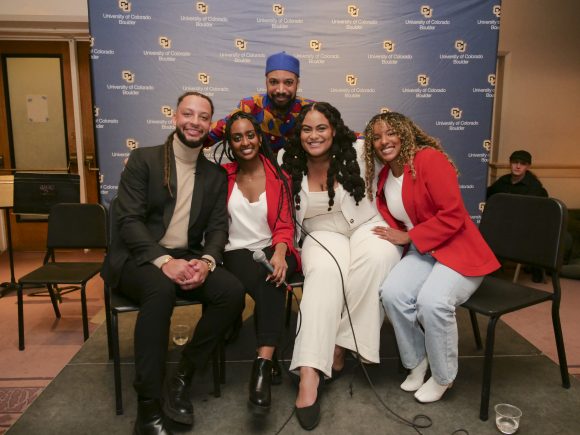
Professor Reiland Rabaka (top middle), along with the Center for African and African American Studies student co-founders Isaiah Chavous, Ruth Woldemichael, Karia White and Audrea Fryar. (Courtesy of Casey A. Cass/University of Colorado)
The University of Colorado Boulder’s Center for African and African American Studies (CAAAS) held its grand opening on Feb. 1.
The center is a first for the CU Boulder campus and was met with praise from local and state leaders.
“I’m thrilled to congratulate CU Boulder, the center’s founding director, Reiland Rabaka, and everyone else who’s worked so hard to make this possible,” said Colorado Governor Jared Polis in a video statement proclaiming the opening of CAAAS.
Deion Sanders, the new head football coach at CU Boulder, also attended the event.
“First and foremost, we have a permanent space on the CU Boulder campus to showcase and share African, African American and African diasporan culture,” said Rabaka in an interview with the CU Independent.
The center functions in three main ways: as a base for research, a platform for visual and performing arts and a resource for student studies. It was established in May 2021 by Rabaka, a professor in CU Boulder’s Department of Ethnic Studies, along with several students, including Ruth Woldemichael, Karia White, Audrea Fryar and Isaiah Chavous.
“That’s also a very unique thing about the center,” Rabaka said, “is that it’s founded by a faculty member in collaboration with students.”
CU Boulder’s Fall 2022 Enrollment Profile reported Black and African American student enrollment at 2.6%, which falls short of the nation’s average of 14%, according to a 2019 report from the U.S. Department of Education. The center plans to play a role in Black student and faculty recruitment. However, Rabaka said that CAAAS is only a piece of the puzzle.
“They [CU Boulder administration] shouldn’t put it all on the center,” he said. “We’re going to need support from the admissions office; we’re going to need support from student affairs and ODECE [Office of Diversity, Equity, and Community Engagement]; we’re going to need support from all the different colleges as well.”
For the broader Boulder area, Rabaka detailed the role of the center in providing a connection between the community and the college. So far, the center has been supported by the NAACP Boulder County and, according to Rabaka, has partnered with multiple high schools in the area.
“One of the mottos and the missions of Black studies when it started in the 1960s was that we are supposed to be a bridge from the campus to the community,” Rabaka said, “that we’re supposed to take knowledge from the campus and synthesize it–remix it–with the knowledge that comes from the community.”
This idea of the center as a “bridge” is applicable in more ways than one. Throughout his interview with the CU Independent, Rabaka specified that the center invited a diverse array of people who were supportive of the Black community, not just Black students.
“We need allies. We need people who are not just saying ‘Black Lives Matter’ [who] will show up, show us that our lives really matter,” he said.
Ultimately, Rabaka aims for the center to provide a space for inclusivity and intersectionality.
“I want to make sure that we’re including a fuller range of folks when we start talking about the ‘new’ CU Boulder,” he said.
Contact CU Independent Staff Writer Ann Marie Vanderveen at anva3588@colorado.edu.
